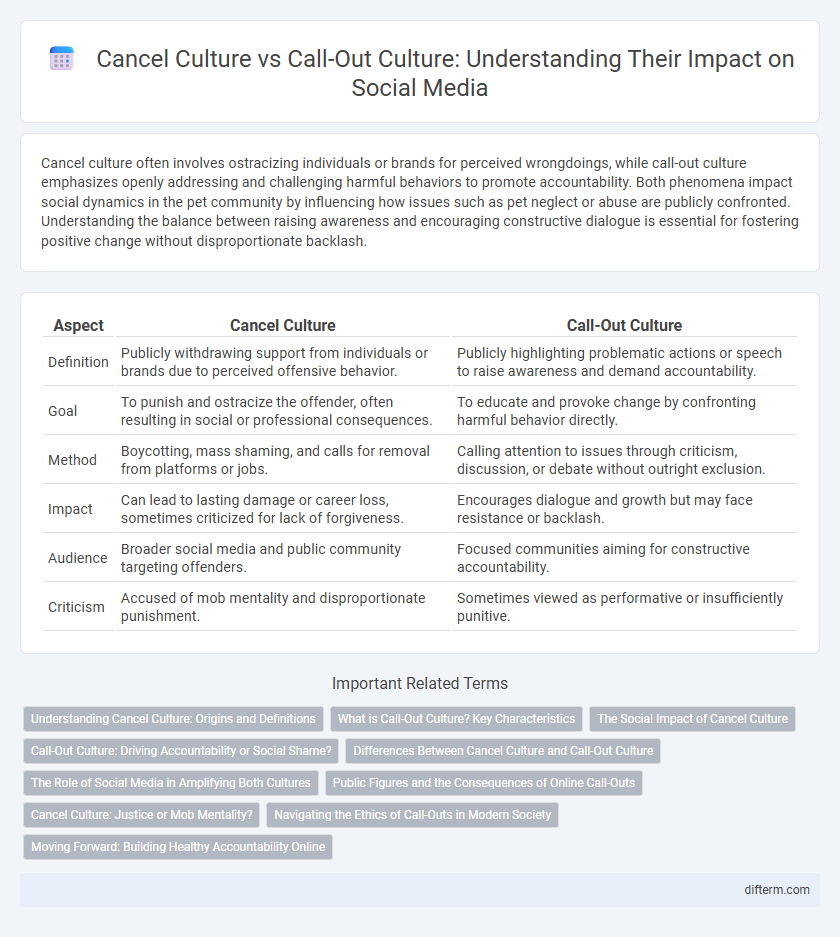Cancel culture often involves ostracizing individuals or brands for perceived wrongdoings, while call-out culture emphasizes openly addressing and challenging harmful behaviors to promote accountability. Both phenomena impact social dynamics in the pet community by influencing how issues such as pet neglect or abuse are publicly confronted. Understanding the balance between raising awareness and encouraging constructive dialogue is essential for fostering positive change without disproportionate backlash.
Table of Comparison
| Aspect | Cancel Culture | Call-Out Culture |
|---|---|---|
| Definition | Publicly withdrawing support from individuals or brands due to perceived offensive behavior. | Publicly highlighting problematic actions or speech to raise awareness and demand accountability. |
| Goal | To punish and ostracize the offender, often resulting in social or professional consequences. | To educate and provoke change by confronting harmful behavior directly. |
| Method | Boycotting, mass shaming, and calls for removal from platforms or jobs. | Calling attention to issues through criticism, discussion, or debate without outright exclusion. |
| Impact | Can lead to lasting damage or career loss, sometimes criticized for lack of forgiveness. | Encourages dialogue and growth but may face resistance or backlash. |
| Audience | Broader social media and public community targeting offenders. | Focused communities aiming for constructive accountability. |
| Criticism | Accused of mob mentality and disproportionate punishment. | Sometimes viewed as performative or insufficiently punitive. |
Understanding Cancel Culture: Origins and Definitions
Cancel culture originated as a form of social accountability where individuals or groups face public backlash for perceived offensive behavior. It differs from call-out culture by emphasizing sustained withdrawal of support or boycotting rather than immediate criticism. Understanding these distinctions clarifies the complex dynamics of modern social justice movements and online discourse.
What is Call-Out Culture? Key Characteristics
Call-out culture involves publicly highlighting and criticizing individuals or groups for offensive behavior or statements, often on social media platforms. It emphasizes accountability and social justice, seeking to address harmful actions without necessarily promoting permanent exclusion. Key characteristics include swift public exposure, moral judgment, and a collective push for change or apology.
The Social Impact of Cancel Culture
Cancel culture significantly influences social dynamics by holding individuals and organizations accountable through collective public scrutiny, often leading to reputational damage and social exclusion. This phenomenon reshapes public discourse by amplifying marginalized voices, yet it also risks fostering divisiveness and suppressing open dialogue. Research from the Pew Research Center reveals that 59% of adults believe cancel culture inhibits free speech, highlighting the complex balance between social justice and freedom of expression.
Call-Out Culture: Driving Accountability or Social Shame?
Call-out culture functions as a mechanism for holding individuals and organizations accountable by publicly addressing harmful behaviors, often leveraging social media's reach to amplify marginalized voices. While it can promote social justice and transparency, call-out culture also risks fostering social shame, potentially leading to disproportionate backlash and hindering constructive dialogue. Evaluating its impact requires balancing the need for accountability with the importance of empathy and opportunities for growth.
Differences Between Cancel Culture and Call-Out Culture
Cancel culture seeks to publicly shame and ostracize individuals permanently for their actions, while call-out culture aims to highlight problematic behavior to promote accountability and change. Cancel culture often results in social exclusion without room for dialogue, whereas call-out culture encourages conversations to address and correct issues. Understanding these differences helps foster constructive social interactions and responsible activism.
The Role of Social Media in Amplifying Both Cultures
Social media platforms like Twitter and Instagram play a crucial role in amplifying both cancel culture and call-out culture by rapidly spreading information and mobilizing public opinion. The viral nature of posts enables swift collective action, often magnifying the impact of accusatory messages and social accountability demands. Algorithms that prioritize engagement can intensify polarization and outrage, reinforcing the visibility and consequences of both canceling and calling out individuals or organizations.
Public Figures and the Consequences of Online Call-Outs
Public figures often face intense scrutiny in online call-outs, where their actions are publicly criticized, leading to significant social and professional consequences. Cancel culture can result in widespread backlash, including loss of endorsements, career setbacks, and damaged reputations. These digital repercussions highlight the complex power dynamics between public accountability and the potential for disproportionate punishment.
Cancel Culture: Justice or Mob Mentality?
Cancel culture often sparks debate as it blurs the line between holding individuals accountable and enabling mob mentality, where social media outrage can lead to disproportionate consequences. This phenomenon highlights the power dynamics of collective punishment, raising concerns about due process and the potential for misjudgment without a thorough examination of facts. Understanding cancel culture requires analyzing its impact on freedom of expression, social justice, and the ethical implications of public shaming in digital spaces.
Navigating the Ethics of Call-Outs in Modern Society
Call-out culture involves publicly highlighting problematic behavior to demand accountability, while cancel culture often seeks social or professional exclusion. Navigating the ethics of call-outs requires balancing the pursuit of justice with the potential for disproportionate consequences and harm to rehabilitation. Emphasizing empathy, context, and constructive dialogue can foster accountability without perpetuating cycles of social ostracism.
Moving Forward: Building Healthy Accountability Online
Building healthy accountability online requires distinguishing between cancel culture and call-out culture, emphasizing constructive dialogue that encourages growth rather than punishment. Promoting empathy and nuanced understanding in digital interactions fosters environments where individuals learn from mistakes without fear of disproportionate backlash. Platforms can implement clear policies and support restorative practices to create spaces that prioritize accountability alongside respect and rehabilitation.
cancel culture vs call-out culture Infographic

 difterm.com
difterm.com